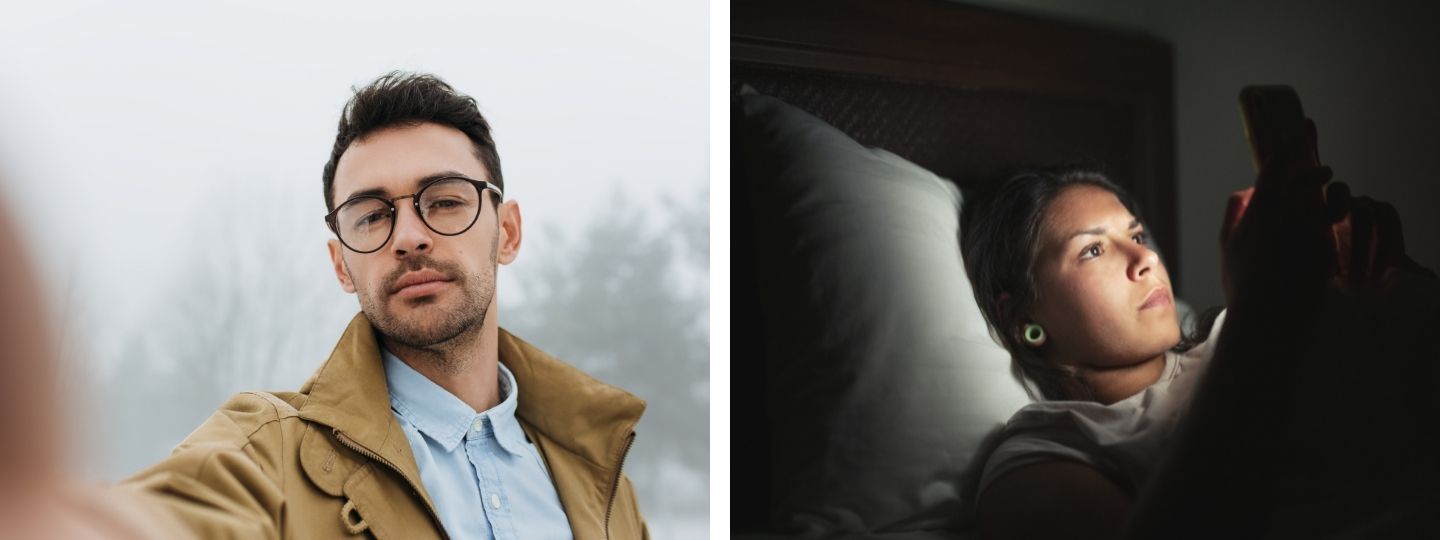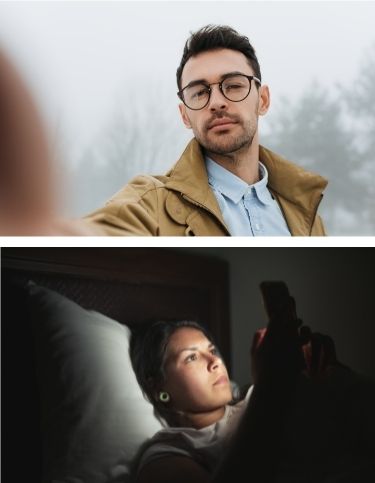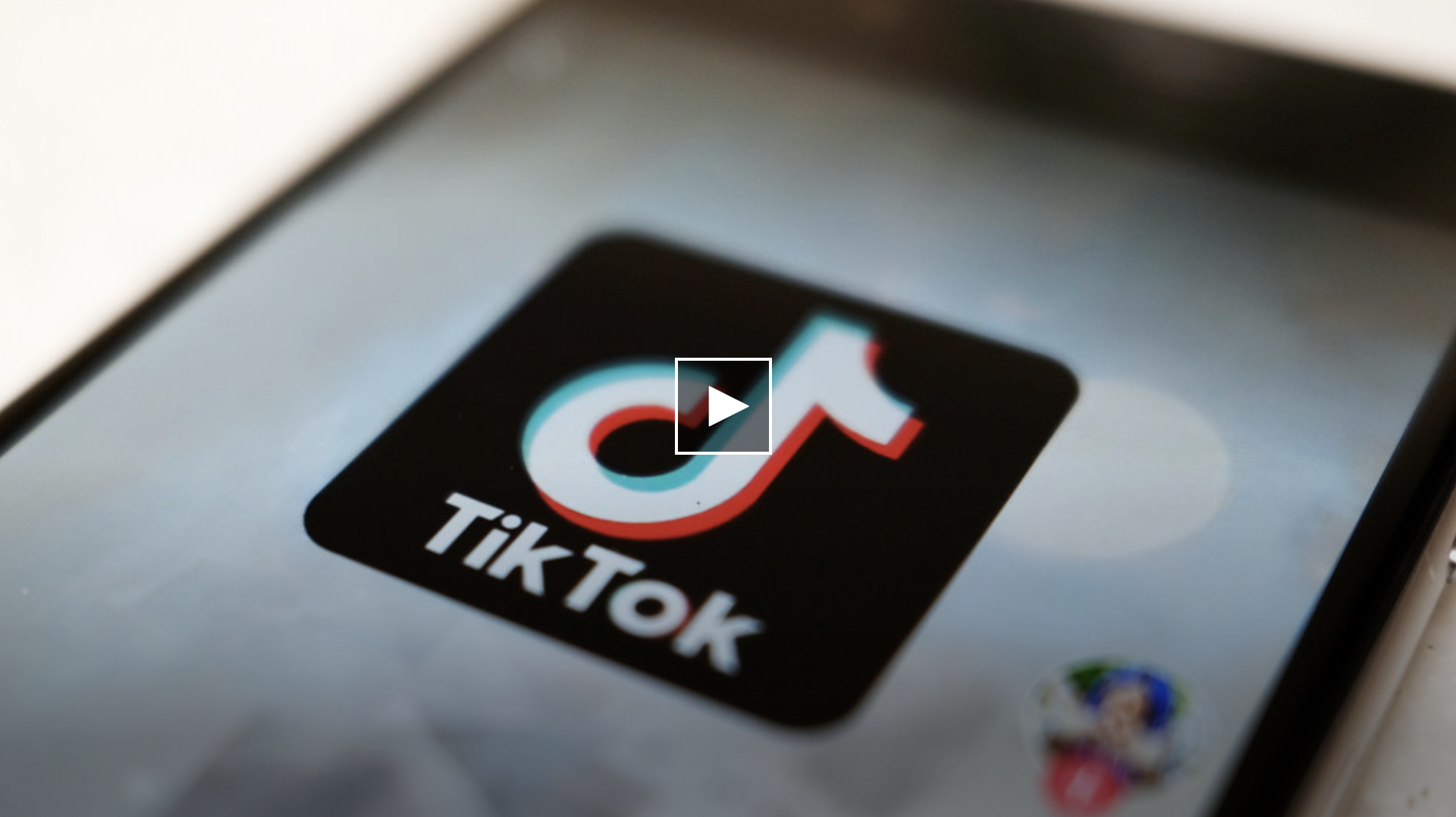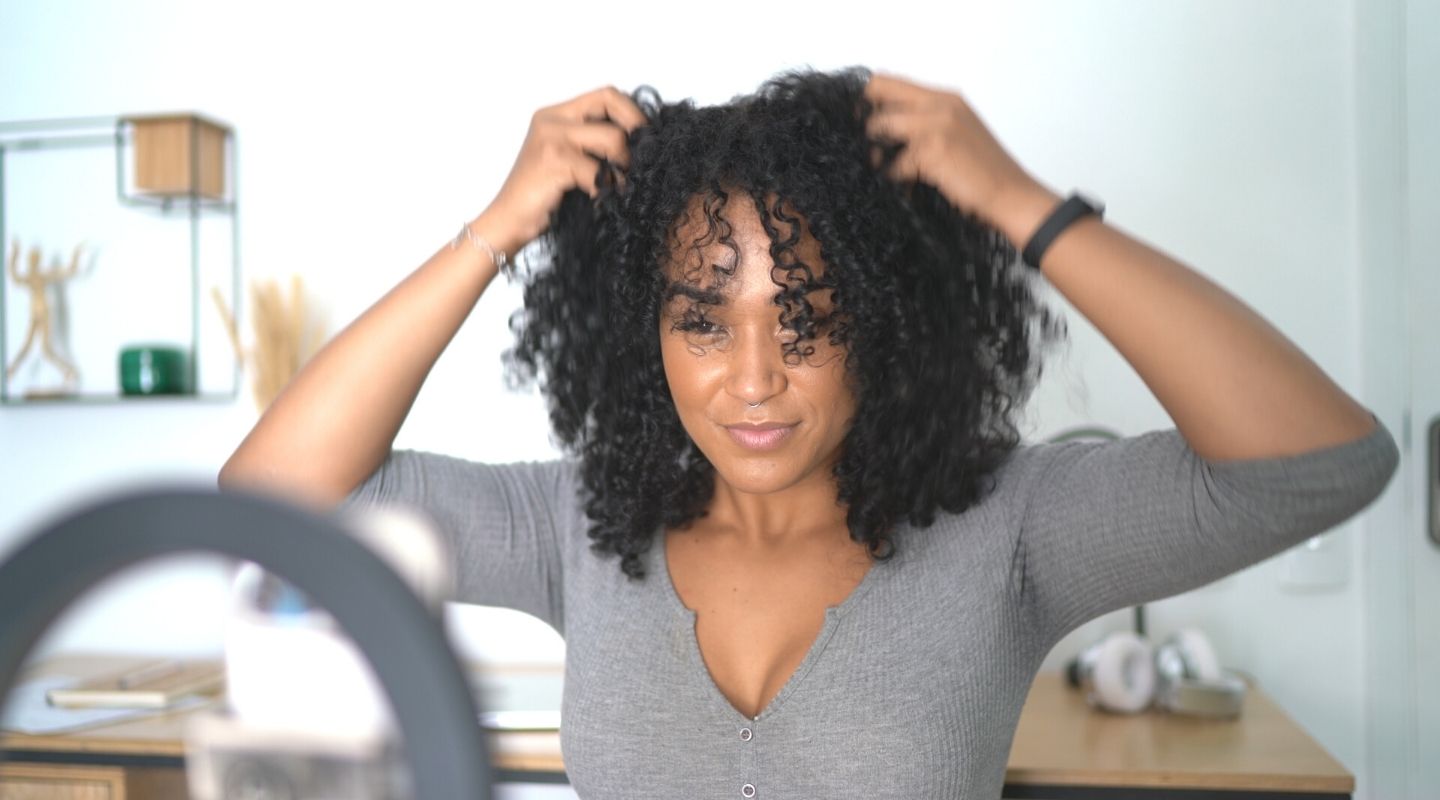Do You Use a Filter Every Time You Post?
Reading Time: 6 minutesIf you answered yes to that question, you’re not alone. Who doesn’t want whiter teeth, brighter skin, more symmetrical features? Social media filters let us have that and more, so we can keep up with all the other filter-using selfie-takers in our feeds. How could there be anything wrong with that?
It’s a natural impulse to want to present ourselves in the best light. But research on filters and mental health reveals that filtering actually depletes self-esteem and distorts body image. The further our filtered selfies get from how we really look, the worse we feel about ourselves. And while it’s slowly becoming more accepted to talk about “not being okay” on social media, we’re still supposed to look good while talking about it.
Questions?
All calls are always confidential.
What Is a Social Media Filter?
Appearance-altering filters on social media, also known as beauty filters, are photo editing tools that use artificial intelligence and computer vision to change facial features. For example, the TikTok “skinny filter” makes a face look slimmer, while Instagram’s “perfect face filter” adjusts facial features according to a supposedly ideal ratio.
Sometimes referred to as AR (augmented reality), filters on social media have become increasingly popular. According to Snapchat, more than 90 percent of young people in the United States, France, and the UK use AR products on the app. Meta reports that more than 600 million people have used an AR effect on Facebook or Instagram.
Know the Facts
90% of young adult women in a City University of London study said they used filters, because they felt pressured to look a certain way on social media.
New Research on Filters and Mental Health
A 2021 study by City University of London researchers explored the negative effects of filters on mental health. Participants included 175 young women and nonbinary people, ages 18–30, with the majority being 20 and 21. One of the most striking findings was that 90 percent of the young women in the study reported using filters or editing their photos.
The study also found answers to the question, What’s the filter everyone uses the most? The five most common filters or edits were those used to even out skin tone, brighten skin, whiten teeth, bronze skin, and take off weight. In addition, participants used filters on social media to reshape their jaw or nose, make their lips look fuller, and make their eyes look bigger.
“Young women told us they feel under considerable pressure to present themselves as fun, happy and sociable—as well as effortlessly beautiful—reflecting the ways that appearance pressures have extended into presenting ‘a perfect self.’ They reflected self-critically on every aspect of themselves, including their clothes, shoes, style and looks, and often worried that they might ‘bring friends down’ in a group shot. It is hard to overstate the palpable sense of pressure they conveyed.”
Study author Rosalind Gill, Professor of Social and Cultural Analysis
City University of London
The Negative Effects of Filters
Looking at the association between filters and mental health, the study found the following statistics on the negative effects of filters:
- 94 percent of participants said they felt under pressure to look a particular way, and more than half of those said the pressure was intense
- 70 percent felt pressure to showcase a “perfect life”
- 86 percent said their social media representations did not reflect their real life.
The researchers stated, “Young women told us that these standards [of attractiveness] are ‘unattainable’ and ‘toxic’ and that they are wearing them down and making them unhappy.” In addition, young people with low self-esteem and poor body image are more likely to use filters, further reinforcing the negative belief that their appearance isn’t good enough.
Moreover, these feelings and behaviors start early. Research conducted by the Dove Self-Esteem Project in 2020 found that 80 percent of girls have downloaded a filter or used an app to change the way they look in photos by age 13.


Body Dysmorphia and Social Media Filters
Another link between filters and mental health is the negative impact on body image. Research shows that young adults who frequently use filters on social media often have increased feelings of dissatisfaction with their actual face and body. Not only are they comparing their appearance to “perfect” images of celebrities and peers, they’re judging themselves against their own filtered selfies. This constant comparison can wreak havoc on body image and self-esteem.
In fact, the collision of comparison syndrome, body dysmorphia, and social media have created a “filter dysmorphia,” also referred to as Snapchat dysmorphia. Dysmorphia, also called body dysmorphic disorder, is a mental health condition in which the person is obsessed with the perceived flaws in their face or body. Social media comparison and filters on social media cause people to strive for unrealistic standards of beauty, contributing to increases in dysmorphia.
Hence, young people with filter dysmorphia experience a sense of disconnection between how they really look and the edited images they share with the world—a kind of self-objectification. That may be why people who use photo editing apps regularly are also more likely to consider having cosmetic surgery. Yet another aspect of this issue is the way in which filters are inherently racist—lightening skin, narrowing noses, and otherwise shifting facial features toward a Eurocentric standard of beauty.
TikTok’s ‘Bold Glamour’ Filter Gives the Message That You’re ‘Not Good Enough,’ Says Newport’s National Advisor of Healthy Device Management

So, Should I Edit My Photos or Not?
Using filters on social media isn’t necessarily a bad thing. To stop filtering your pictures can seem scary in the narcissistic world of social media, where we are constantly being judged (and judging others) on appearances. However, there are ways to develop healthier habits for filtering, posting, and scrolling. It starts with becoming more aware of how filters, body image, and social comparison impact your emotions and well-being on a day-to-day basis.
Here are some tips for managing your use of filters and mental health issues associated with them.
Do a “selfie audit.”
Pay attention to how much time you spend filtering and posting, and how it makes you feel. What is your mood like during and after the editing and posting process? Once you do post, do you keep anxiously checking for reactions and comparing your images to others? Are your posting and social media comparison enhancing your well-being or detracting from it? The answers may help you navigate a path forward that will be more protective of your self-esteem and body image.
Consider the message you’re giving yourself.
Every time you filter a selfie, you’re consciously or unconsciously telling yourself that you don’t look good enough as you really are. You’re buying into a kind of social media distortion—a world in which everyone is creating false versions of themselves in an attempt to meet conventional standards of beauty. How satisfying are those likes and comments you’re striving for, if they’re about an image that isn’t representing who you really are?
Embrace your authentic self.
Remember that our “flaws” are part of what make us interesting, real, and relatable. Practice self-compassion and try appreciating yourself for all your qualities, not just the ones that can be seen in a selfie. Building a caring and supportive relationship with yourself will help you build authentic relationships with others, IRL.
Think about what you could be doing instead.
Less time spent editing and posting might mean more time taking a hike, having face-to-face interactions, or doing something creative. Or are there hard things you need to do, and you’ve been avoiding them by spending all your time on the apps? Consider whether filtering and posting have become a way of avoiding real-life issues or expectations.
Try caring less about what others think.
Emerging adulthood is a time when others’ opinions carry a huge amount of weight. But realistically, what people on social media think about you doesn’t have to affect your daily life. You can choose how much time you spend there. Why not focus your energy instead on cultivating friendships with people who know and love the real you? Research shows that real-life friendships increase happiness, while online networks have neutral or negative effects on well-being.
Treatment for the Negative Effects of Filters on Self-Esteem and Body Image
Social media overuse and social comparison can trigger anxiety, depression, and self-esteem issues, or they can make existing mental health conditions worse. At Newport Institute, we address these issues through treating the root causes, while at the same time supporting young adults to build healthy coping skills and lifestyle habits. That includes developing more balanced relationships with devices in general and social media in particular.
Our clinicians are trained in modalities including Cognitive Behavioral Therapy, mindfulness, and EMDR, and our approach is proven to heal the underlying mental health issues that catalyze conditions like body dysmorphia and social media addiction. Contact us today to learn more.

